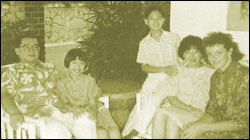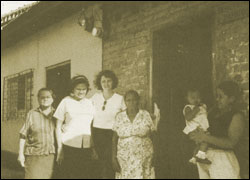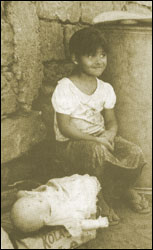

| Quick Links |
A blind Nicaraguan student helps a Texas Rotarian see the importance of even "the smallest gesture."
Every true Rotarian has a story to tell, a defining moment that captures what Rotary is all about. In this issue we offer another installment of "Rotary story," a regular feature in which individuals describe how the hands-on experience of being a Rotarian - putting Service Above Self - has affected their lives.
Rotary First found D'Lisa Simmons in high school. As a senior in Texas City , Texas , USA - a Gulf Coast refinery town - she kept busy with honor society, thespians, choir, band, and drill team. Gifted on English horn and oboe, she envisioned a career as "a band director or a famous symphonic oboist."
In recognition of her accomplishments in school, the local Rotary club made her a Junior Rotary Ann, a designation that predated women's admission to Rotary in the late 1980s and feted her with a luncheon. "I wasn't thinking about becoming a Rotarian," says 40-year-old Simmons today. "All I remember is twirling spaghetti on my fork, like my daddy taught me, and talking about my school activities to a bunch of older men with white hair. That's what I thought Rotary was."
 Rotary next touched Simmons in 1987. She'd abandoned music and graduated from the University of Houston with a degree in business administration. But banking scandals and plunging oil prices devastated the local economy and the job market. "I couldn't even get a job as a secretary because I couldn't type worth a hoot," she recalls with a chuckle. So she enrolled in law school to study corporate law. Then the wanderlust hit.
Rotary next touched Simmons in 1987. She'd abandoned music and graduated from the University of Houston with a degree in business administration. But banking scandals and plunging oil prices devastated the local economy and the job market. "I couldn't even get a job as a secretary because I couldn't type worth a hoot," she recalls with a chuckle. So she enrolled in law school to study corporate law. Then the wanderlust hit. One of her best friends went to Austria on an Ambassadorial Scholarship from The Rotary Foundation of RI and sent back glowing reports on how rewarding the experience was. Inspired, Simmons applied for one too. Her friend's mother encouraged Simmons to see the world and then return to school. "I thought: If Rotary can provide for that, wonderful," Simon says. "And that decision changed my life."
She received the scholarship and went to Singapore , a nation she knew little about. "I pictured old war movies and how I'd be in a little-bitty two-seater plane, landing on a dirt runway in a jungle," she laughs. Instead, she arrived at a modern, world-class airport. It was the first of many lessons she would learn about the world beyond Texas .
While studying law at the National University of Singapore, Simmons attended meetings of the Rotary Club of Singapore, the country's largest. "Their international [service] committee had a project in the Philippines . We're talking about tens of thousands of dollars being raised for water wells in rural villages. That's when I realized that Rotarians do important work."
As she explored Asia in her free time, a succession of events "opened my eyes." While touring India with a Rotarian friend, she witnessed extreme poverty for the first time. "People lived in rags on the street. Children begged us for food, and when we gave something, they fought over it in the filthy street." In Srinagar , a summer destination for wealthy Indian families, Simmons saw youngsters running barefoot in the brittle frost. She wanted to help but didn't know how.
Trekking the Himalayas , Simmons saw more of the same. "Here's this little girl standing on the hill, buck naked, and it's cold. All she's wearing are trinkets in her hair and a plastic beaded necklace, like you see at Mardi Gras in New Orleans . I thought: She's so beautiful, yet her life is so hard. Just staying warm is hard in Nepal . Finding food is hard. I realized that I throw away more food in a day than these people eat in a week. That shamed me."
Returning to Texas , Simmons finished law school, became a lawyer, and joined the Rotary Club of Galleria Area (Houston). In 1997, her club, along with eight other Houston-area clubs, participated in a World Community Service project in Chinandega , Nicaragua , a turning point in her Rotary Experience.
Rotarians in District 5890 had begun providing assistance to a school for disadvantaged children operated by Father Marco Dessy, an Italian priest. Their involvement intensified in the aftermath of Hurricane Mitch, which left hundreds of families homeless in late 1998. Images of children scavenging the local garbage dump for food lent urgency to the Rotarian' effort. In June 2000, as president-elect of her club, Simmons visited Chinandega and saw some of those children with her own eyes. "I have a photograph of a little girl with a broken doll," Simmons says. "She's so, pitiful, but she has her doll. It's a vision of people without any hope."
The Texas Rotarians team with other groups such as Food for the Poor, a non profit organization based in Arkansas , USA , to provide low-cost dwellings for Chinandega families. Funds raised by the clubs were equaled by a Matching Grant from The Rotary Foundation of RI, and that total was matched by Food for the Poor, fueling the Rotarians' enthusiasm. "It was a no-brainer, Simmons says. "It took off like wildfire in our district. Everybody wanted a piece. The project provided 330 houses, and now those people are out of the dump."
Subsequent grants helped to improve water and sanitation, erect fencing for individual land plots, and develop an agricultural program to raise subsistence crops and poultry.
 On the same trip, Simmons toured the Rotarian-supported Santa Lucia School for the Blind, a refuge for children who faced an otherwise bleak existence. Some students had come from homes where they had been bound hand and foot by desperate parents to keep them from wandering off. Simmons recalls one girl saying that she'd never felt the breeze on her face from running because she was tied up all her life. "In Nicaragua ," Simmons explains, "if you're blind, you're also invisible. There are no social services for the blind. Father Matco put 20 blind kids in the school, where they learn Braille and how to dress themselves and eat with tableware. Some later matriculated into regular schools and do very well."
On the same trip, Simmons toured the Rotarian-supported Santa Lucia School for the Blind, a refuge for children who faced an otherwise bleak existence. Some students had come from homes where they had been bound hand and foot by desperate parents to keep them from wandering off. Simmons recalls one girl saying that she'd never felt the breeze on her face from running because she was tied up all her life. "In Nicaragua ," Simmons explains, "if you're blind, you're also invisible. There are no social services for the blind. Father Matco put 20 blind kids in the school, where they learn Braille and how to dress themselves and eat with tableware. Some later matriculated into regular schools and do very well." At the school, Simmons met a 20-year-old student named Evelyn Urbina Zapata, who immediately said to her, "I want to be a lawyer!" When Simmons replied, "If you keep up your grades and get a college degree, you can do it," Evelyn's face lit up. Simmons realized that this was the first time anyone had ever encouraged the girl. Weeks later, she sent Evelyn a gift: a charm bracelet with an angel, and a note that read: "I hope you're doing well. Please stay in school and know that we're thinking about you.
In March 2002, Simmons returned to Nicaragua with a Braille typewriter for Evelyn, who was then a high school sophomore in Leon . It was the only gift Simmons wanted from her husband for her own birthday. She knew Evelyn dreamed of college but needed Braille to get through public school.
"She was just so excited," Simmons remembers. "She hopped around, smiling ear to ear. Evelyn threaded paper in the machine and began typing. Her exuberance was one of the best birthday gifts I ever received."
Afterward, Simmons met with Dr. Ernesto Medina, a chancellor of the University of Nicaragua in Leon . Dr. Median promised that if Evelyn maintained her high grades, she'd have a seat at the University. Simmons rushed back to Chinandega to tell Evelyn, who had a surprise of her own. While Simmons was away, Evelyn had typed a note to her, which she now began to read aloud in Spanish. Frank Juezo, a member of the Rotary Club of Humble Intercontinental, Texas and a leader in the Chinandega projects, translated as Simmons wrote down the words:
I feel emotional and happy to have received your gift. It will help me very much in my school and help very much in my university studies. I've always kept you in my mind, and I always remember you in every moment. It is impossible for me to describe the great feeling I had inside when I received [the charm bracelet] and card. I keep [them] very close to me. You make me feel like a useful person. I am thankful to you and your generous gestures. Heaven gave me the joy to meet an angel when I met you.
Simmons then asked impulsively, "Evelyn, would you like to touch my face?" The young woman burst into sobs, and Simmons was mortified until Huezo explained that she was weeping because she'd been too shy to ask for a chance to finally "see" her friend. "I told Evelyn it was OK but she still wouldn't touch me," Simmons says. "Finally, I pulled her hands to my face, and she passed them over like 'butterfly kisses,' light as a flutter. She noticed my big eyes and that my hair was short and curly like hers. It was one of the most intimate moments I ever share with anyone."
 Six months later, on her way to Aspen , Colo. , USA , Simmons was in the Denver airport when she encountered Nancy Stevens, a former champion skier in the Paralympics. Simmons was impressed with the blind woman's ability to navigate easily with her guide dog. The two chatted during the bus ride to Aspen . "It struck me that as a child, Nancy didn't let her siblings baby her, so she was never told she couldn't do anything." Simmons recalls. "Whereas in Nicaragua , the blind are often told they can't do anything."
Six months later, on her way to Aspen , Colo. , USA , Simmons was in the Denver airport when she encountered Nancy Stevens, a former champion skier in the Paralympics. Simmons was impressed with the blind woman's ability to navigate easily with her guide dog. The two chatted during the bus ride to Aspen . "It struck me that as a child, Nancy didn't let her siblings baby her, so she was never told she couldn't do anything." Simmons recalls. "Whereas in Nicaragua , the blind are often told they can't do anything." When she learned that Stevens has a college degree in music education, lives independently, works a demanding job examining disability claims for the U.S. Social Security Administration, and enjoys bike riding and rock climbing, Simmons knew the woman would be an inspiration to the students at Santa Lucia. Stevens agreed, and a trip was arranged for November 2002. Stevens brought the students a Braille machine and walking canes, which she taught them to use. She also demonstrated her own "blind person's Palm Pilot" - an electronic gadget with a pop-up Braille keyboard and voice activator that speaks back all the entries.
Stevens' trip to Santa Lucia was a success and inspire Rotarians in District 5890 to intensify their support for the school. Simmons says plans include organizing volunteer teams of eye surgeons and applying for grants from The Rotary Foundation to supply the school with computers and Braille printers. "They need our help, because nobody should be invisible," Simmons says of the societal bias the children still face. "That's what Rotary does, right? It helps the invisible and the helpless. Rotary was taught me so much about life. My time abroad taught me there's more than one perspective on everything and many ways to accomplish a goal, once you care. And Evelyn Zapata's excitement over a charm bracelet taught me that me that the smallest gesture, or a few words of encouragement, can alter someone's entire life. Most importantly, Rotary service reminds us that wherever we live, we all share the same basic needs for loving care and the recognition that - as Evelyn said - we are useful human beings."